Chapel of Inadvertent Joy
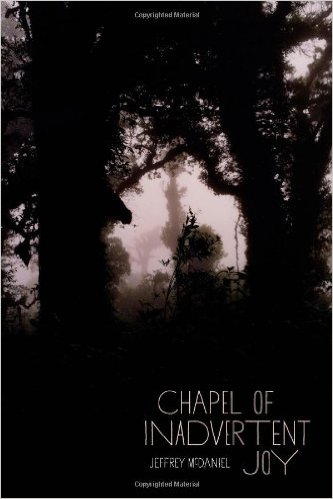
 by Jeffrey McDaniel,
by Jeffrey McDaniel,
University of Pittsburgh Press, 2013,
paper, 88 pages, $15.95,
ISBN: 978-0-8229-6260-1
Buy the Book
After reading his fifth book of poems, I propose Jeffrey McDaniel as the Louis CK of poetry: He’s sincere and unsanitized, flinging humorously dark insights from a position of middle-aged white-male self-awareness. Like the comedian, McDaniel’s voice makes the recognizable male desires and insecurities seem fresh and relatable, exploring the engaging middle ground between vulnerability and masculinity.
The first section, “Little Soldier of Love,” sets up the themes of lust and infidelity that permeate the text. The book’s introductory poem, “Hello,” deposits the first of many references to Adam and Eve and human failing:
but please, forgive me, because complaining is like sex for old people.
Have you ever cringed with your whole body? Been so filled with shame
you wanted to wriggle out of your flesh, like a serpent in a forest,
like the snake that betrayed Eve?
McDaniel’s humor keeps even loaded passages like the above from turning sluggish or dour. Later, in a persona piece from Eliot Spitzer’s point of view, McDaniel asks, “Lord, /swaddle me in a blanket dipped in smallpox,” and expresses a desire to “open my mouth and bite /into the snake’s Adam’s apple.” Again, playful language buoys the dark content.
Sexual desire, from both the male and female perspective, as a means both of alienation and validation, is a primary concern here. In “Track of Now,” a virile voice experiences “what it feels like to have sex with the universe,” as he imagines that “each woman in Tompkins Square Park /eats her ice cream just for me.” The self-assured male voice reemerges in the later poem
“A Brief History of Immorality,” which features a twenty-two year-old man strutting through Manhattan after a sexual conquest.
McDaniel explores female desire as well, in poems like “Happy Marriage,” which describes a woman’s urge to break free from the monotony of married life:
You’re sitting on the sofa. Your husband
is upstairs, your child sleeping. There are dishes
in the sink with your name on them. A dark sedan
pulls up to the curb of your mind.
This feminine yearning sets the stage for the book’s second part, “Reflections of a Cuckold and Other Blasphemies,” wherein a number of male voices react to the infidelity of their wives. While sometimes heartbreaking, these poems crackle thanks to McDaniel’s imaginative and precise language:
so years later, when your wife stumbles home
with that glazed, seen-god look in her eyes, the sweat
of his trigger-happy fingers still greasing the white
napkin of her thighs, you can settle into that moment,
ask her how it was, if you can witness next time.
The last line here reflects the acceptance that many of these male voices arrive at as the cuckold poems continue. They are defeated in the way that the men in “Track of Now” and “A Brief History of Immortality” are victorious. McDaniel does some of his best work in describing the emasculated male.
In “The Cuckold in Autumn,” an older male voice watches a young couple trying to start their truck:
He shuffles towards me, mumbles
something about a jump. My loins
ignite like a furnace. Welcome
to my world, I think, attaching cables
under the sprung hood, revving the juice.
This mindset reaches a crescendo in the poem entitled “Middle Age.” In it, the speaker explains how his “testosterone feels like watered-down lemonade,” and how he couldn’t even “impregnate an awkward pause.” All of this is in stark contrast to the younger male self, the one who walked next to a pregnant wife feeling so masculine that he imagines “being a crop duster / filled with semen and pollinating all the women /passing in springtime dungarees.”
All of this sounds rather pessimistic, these poems about the fading power of the aging man, unable to maintain either an erection or a relationship. But McDaniel’s cumulative effort reveals the modern male as master of the universe, neutered cuckold, and caring father all at once. He ends the collection
with its uplifting titular poem. In “Chapel of Inadvertent Joy,” the speaker urges us to savor the good moments, whether that’s
“a white horse in a sunlit pasture at the end of summer” or when a “garden hose slips out of your hand /and sprays you in the face,” or simply watching your “wife and daughter lollygag in the grass.” McDaniel’s voice, capable of portraying all this with wit, empathy, and metaphorical pyrotechnics, is one we would be wise to savor as well.
— Michael Christian
I See Hunger’s Children
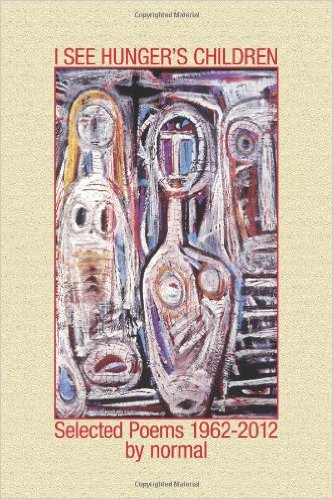
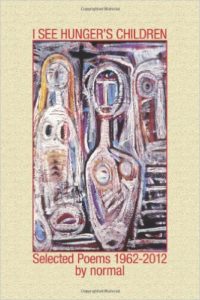 Selected Poems 1962–2012, by normal,
Selected Poems 1962–2012, by normal,
LUMMOX Press, 2013,
111 pages, paper, $15,
ISBN: 978-1-929878-80-2
Buy the Book
My favorite poem in this book is “green buses,” set in Newark, 1963, when men began thinking of ways to flunk their draft physical. The narrator shows up as: “98 lbs / pigtailed, silver fish ear ringed / gold lamé coat.” He recalls, “crew cut guys yelling / ‘sweetheart! hey sweetheart . . .’”
but I was naked
& my dick was average
your typical run of the mill medium sized Jewish dick
Asked what he does for a living, he responds “imam jazz poet.” The sergeant says, “section 10 — GET THE HELL OUT OF HERE!!” Soon the narrator is laughing with an old friend, also “section 10,” who wore “. . . a sandra dee skirt / an annette funicello hairdo / & a joan crawford dinner jacket.”
This poem captures the nascent counter-culture / anti-war movement from the perspective of a streetwise Jewish kid — part Allen Ginsberg, part Lenny Bruce — laughing back at the unenlightened macho boys. He already knows it’s better to make love not war. This poet understands how the world works — or at least how America works. In “American Child,” “the baby is diced up in dinty moore stew” and “the newspapers are shouting from sea to sleazy newspaper sea . . . from the sands of sam’s club to the halls of home depot . . .” His poem “awakening —1967” has this epoch-defining passage:
the summer of love saw all the brylcream
boys I used to play chess with go to
viet nam & go to my lai & come home
in body bags & throw bricks thru the
windows of 7-11s & take hideous lsd
trips & have satoris in front of the
tasmanian devil pit at the san diego
zoo —
Although the collection opens with the seven-page title poem, I prefer the shorter poems like “at the end of the beam with mick and lou,” the story of a twenty-three year friendship between two construction workers, one of whom gets cancer. There’s a Philip Levine-like setting with Richard Price-like dialogue. Not long ago, Tony Hoagland wrote a piece for Harper’s about “imagining a renewed role for poetry in the national discourse — and a new canon.” This poem, which shows us the awkward ways men, especially working class men, try to be friends and express feelings, no matter how inarticulately, would be a contender for my list.
In the introduction, publisher RD Armstrong calls normal a spoken word (italics his) poet before the phrase existed. Some of the longer poems in particular would seem to fit this description. However, in my experience, many of today’s “spoken word” poets could afford to spend a little more time with the written word. Spoken word or not, no one can doubt that normal is a reader. One of the delightful details in this volume is his choice of epigraphs, from Brecht, Camus, Lorca, and Vallejo to Sri Rama Krishna, Gandhi, Thomas Merton, and Bob Kaufman. (“Crossroads” is a wonderful poem about him and Kaufman listening to jazz and getting high together.)
It would be easy to typecast normal as another post-beat iconoclast tossing barbs at everything coarse, crass, and greedy about America, but this volume also contains some very tender and compassionate poems. In “luna and the late sun” he writes of the relationship between his dog and his neighbor and how much he enjoys watching them cavort in his yard:
luna is last stages middle age
plump almost hairless no make-up
lost 2 kids — one to cancer
one to aids
luna is single & what she calls
a “late in life lesbo”
quiet no money torn gray parka
shuku loves luna almost as much as
shuku loves me
This tough guy from Passaic can do more than shoot salvos. Bio notes tell us he’s spent 35 years as an RN. He has a heart too, conspicuously on display in a poem dedicated to the late singer Suzannah McCorkle, “where the songbird sang”:
last yr I heard you killed your
self —
something about depression & that
empty void where the songbird sang
i would gladly have flown into
that void & filled it with
my own singing
This is not the voice of the grizzled survivor, the unbowed cynic, but the caregiver who, in “The Request,” says, “God asks nothing more of a poet / Than to chart the rain.”
I did a double-take at “Appalachian Cabin.” The title is so different from “don’t rape the singing bird,” the bucolic locale a bit far from “upstairs at the hotel dante” (the first line of “the shooting gallery”). It concludes:
The place has survived:
A supreme testimony to the
Genius of a hammer —
Long ago, when the world was
Still trying to live a simple life.
This poet has seen a lot, most of it not very simple. Readers of this book are the benefactors.
— Kevin Sweeney
In a Kingdom of Birds
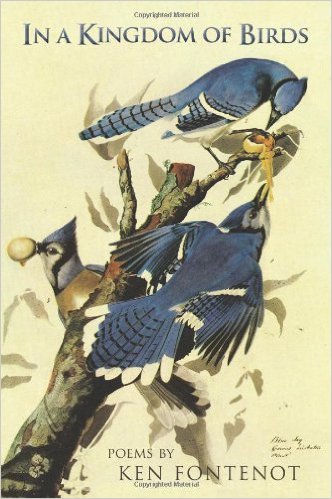
 by Ken Fontenot,
by Ken Fontenot,
Pinyon Publishing, 2012,
73 pages, paper, $15.00,
ISBN: 978-1-936671-07-6
Buy the Book
Can ordinary lives be written simply? Too much mundane detail, and readers drown in trips to Walmart for cat litter, or must grapple with prose poised like safety pins on used clothing, as if literature is a Goodwill bin of the past. Then again, in Gabriel Garcia Marquez’s great novel One Hundred Years of Solitude, among the almost mind-numbing repetitions — similar sounding names, the descriptions of the family’s house being freshly painted or going to seed — there resounds a single, clear bell of loneliness. That kind of purity recalls Ken Fontenot’s poetry.
There’s a contrast in Fontenot’s work between enduring daily routines and a longing to transcend boundaries. He listens for “the high-pitched sound the universe made when it began.” He startles readers with these lines from “Let’s Go Out,” a poem with a clearly stated challenge:
Listen again. You missed it the first time.
Your thoughts were elsewhere. We say,
enough of love, and we mean it. We say,
enough of money, and we mean it.
I wouldn’t give one solitary cent for a new car.
You neither? Let’s go out. The lightning bugs
are as bright as your eyes.
The night is as young as the world.
Fontenot’s narrators in these poems speak from solitude. Their observations are given to readers in a bright, colloquial tone that often contains undercurrents of irony or despair, creating poetic tensions. Family life is also described, with memories of an aunt who says, “The dust has gone to Heaven,” along with Evangeline Parish, in Louisiana, and all the hard-working men with “their belts six or seven notches / on the good side of hunger.” A poem called “From a Son Who Knows Only Books” is a meditation on men who do honest, skilled work with their hands, and on the narrator’s father:
A man is happy with his gun, his boat.
A man is happy with his lawn, his dog.
Just think. I’ll not grow up to be my father.
A childhood full of light and shadows permeates the book, as well as the keenly observed movements of birds. Their cruelty is noted, such as their raiding of nests, but birds also serve as quirky, unpredictable metaphors that imply transcendence. Idealism is never entirely destroyed, even in adulthood. All of us, says Fontenot, hold the kingdom of birds within us, as in these lines from “Our Lips Are Gates”:
Grief: that child in cold weather without
a coat. It sings dirges. It writes elegies.
We with half our noses in shadow, half in light.
We with our bodies soaped and scrubbed.
The dark houses. Conversations in other rooms.
A fireplace. Of two doves
both will forage. Neither will wait.
Perhaps solitude begins to be valued in childhood as well, clarifying perceptions that often conflict. This is something readers can identify with, just as we do in Marquez’s novel. And Fontenot’s moths — they could be the cousins of Macondo’s butterflies, as in these opening lines from “The Words for Containment”:
In my dream, moths are pursuing me
the same way they always have to touch us
in real life. Daylight brings the dream to an end.
Memories of the poet’s childhood, savored as an adult, are turned over like beautiful oak leaves pressed between pages. In “The World Without Me,” as throughout In a Kingdom of Birds, Fontenot’s voice transcends sure boundaries:
I am close to my bed. I am close to my book.
I am close to my chair. And my silence lights the room.
— Sharon Olinka
Calendars of Fire
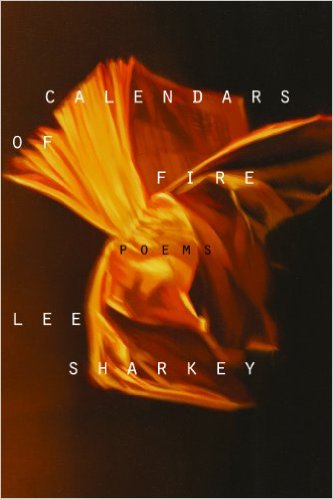
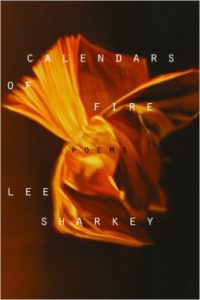 by Lee Sharkey,
by Lee Sharkey,
Tupelo Press, 2013,
60 pages, paper, $16.95,
ISBN: 978-1-936797-26-4
Buy the Book
“Why do we war on each other? This is an unanswerable question we should never stop asking,” writes Lee Sharkey in the reader’s companion to her latest book of poems, Calendars of Fire. Weaving together images from multiple wars, mythology, and personal accounts of grief, this collection of poems addresses the writer’s outrage and disbelief at a world of humans who enact violence upon one another, while also grappling with the inescapable truth we all face: mortality.
The poems often take the form of elegy, prayer, or vision. The theme of transience, introduced in the volume’s first poem, “In the wind,” creates an ominous feeling at the outset:
If you walk the same path everyday through the woods
clearing the way in your coming and going
you know when branches have fallen. Each branch downed
has a trace of the wind of descent vibrating through it.
Immediately Sharkey establishes an eerie sense of fate in this forest of “coming and going,” a barren container for the short experience of life itself. This is a timeless space where “you can read the night, the wind, the lack of it / what has happened back to happening,” a place through which every human and their ancestors have passed.
Desolate images of war proliferate throughout the second section of the book, with many poems formed in sequences of one- and two-line stanzas whose emotional and thematic strength resembles that of a ghazal. In “Hunger recounts it,” she presents the raw desperation caused by war in a scene where personal belongings and furniture are burned for temporary warmth: “Burned the books, first the history, last the poetry, page by crumpled page /No no, give that to me, a neighbor insisted,
trading Akhmatova for 2x4s from graveside crosses.” This haunting parataxis creates an unsettling and believable depiction of starvation during wartime.
Juxtaposed against this despair comes the series “Tiresias at last,” where the Greek god appears: a transgender, blind prophet who sees what others can’t. Strikingly more accessible in style and language, with shorter lines and a sensual tone, the Tiresias series offers respite from the hardship that’s come before. In a tighter, lyric narrative, Sharkey begins with a poem about his transformation from male to female, and continues with “Tiresias tells it”:
Desire is the snake that courses the body
The mouth is one door of its house, the vagina another
When you lie down you lie with the snake
When you rise up you rise with the snake
To insert a shape-shifting, sexualized being at this point in the book seems, at first, an odd choice. However, as Sharkey explains in the reader’s companion to the volume (which is accessible on her website), “All poets are at least in part Tiresias, senses attuned, listening from the sidelines; coveting vision, powerless to make that vision come to pass or prevent its coming.”
Indeed, Sharkey introduces a new strength with the sensuality and prophetic perspective of Tiresias, who, unlike humans, can see beyond the grip of war. Whereas the powerless subjects that appear in preceding poems evoke helplessness, Tiresias accepts human weakness without becoming the slave of it, as in “Seer in vigil”: “Tiresias stands in winter wind / doing nothing but stand in winter wind.” In submitting to the truth of human violence, s/he can rise beyond, redeemed by a broader knowing, as in “With birds on his shoulders”:
Violation rises like a planet
its own sound something quiet
like sliding bodies into water
Altogether, Calendars of Fire offers an evocative redefinition of what we might conceive as “war poetry.” Sharkey’s careful interweaving of language fragments and white space — to connect the personal and global — is most effective when a simple narrative emerges, and is not quite as successful in longer poems, like “Possession,” in which too many worlds and memories are merged to be easily grasped.
Her lyric becomes most clear and beautiful in section III, which presents the aftermath of war, the ruin of sacred places, charred and broken musical instruments, psychic demoralization, grace, and the rebuilding of lives. Amidst the rubble, there is “Listening”:
sleep with me now under the clouds
with your lucid eye open
What is it that I love when I
form the letter with an arc and a down-
stroke
The curve of your head,
my hand rounded to stroke it,
habitat, sphere of a new planet.
Indeed, with her keen vision, Sharkey honors the brutal suffering of the human world while still managing to seed hope for a new, more whole one.
— Kristen Stake


